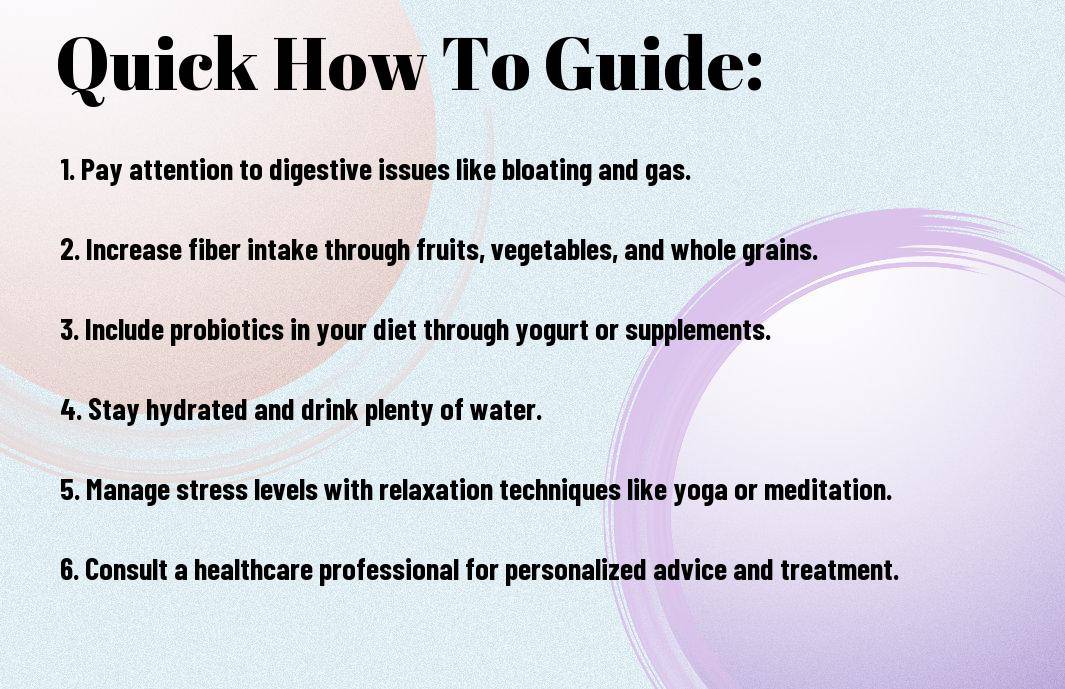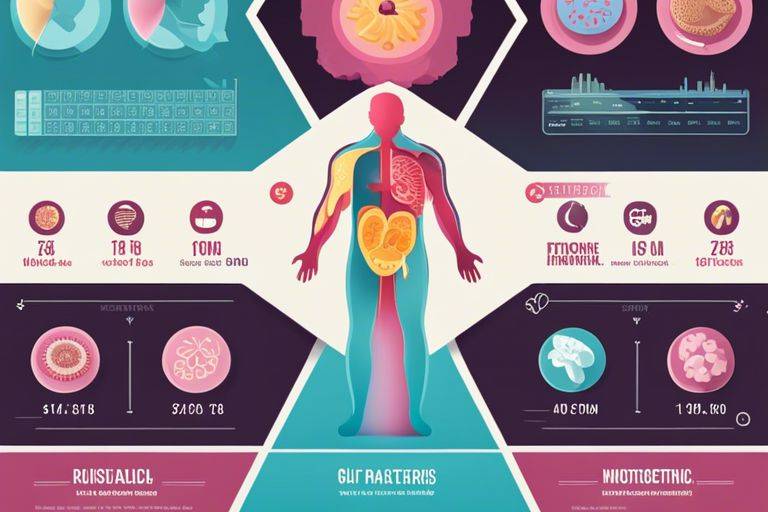Digestion is crucial for overall well-being. Signs of poor gut health can manifest in various ways, affecting not just your digestion but also your immunity, mood, and skin health. If you experience bloating, constipation, frequent stomach upset, or low energy levels, it could be a sign that your gut health needs attention. In this blog post, I will guide you on how to recognize these signs and provide actionable tips to address them and restore your gut to optimal health.

Key Takeaways:
- Common Signs of Poor Gut Health: Symptoms like bloating, gas, diarrhea, constipation, and food intolerances can indicate an unhealthy gut.
- Importance of Gut Health: A healthy gut is necessary for overall well-being, immunity, digestion, and mental health.
- Factors Affecting Gut Health: Diet, stress, antibiotics, and lack of probiotics can disrupt the balance of good bacteria in the gut.
- Ways to Improve Gut Health: Eating a diverse range of fruits, vegetables, and fiber-rich foods, reducing stress, and taking probiotics can help restore gut health.
- Recognizing Individual Triggers: Keeping a food diary and being mindful of how certain foods or situations affect your gut can help pinpoint triggers.
- Seeking Professional Help: If gut issues persist, consulting a healthcare provider or a registered dietitian can provide personalized guidance for improving gut health.
- Long-term Lifestyle Changes: Consistent healthy habits like staying hydrated, getting regular exercise, and managing stress are key to maintaining gut health in the long run.

Recognizing the Signs of Poor Gut Health
While many people may not realize it, poor gut health can manifest in various ways throughout the body. Recognizing these signs is crucial for understanding the state of your digestive system and overall well-being.
Digestive Issues: Bloating, Constipation, and Diarrhea
An imbalance in gut bacteria can lead to digestive issues like bloating, constipation, and diarrhea. These symptoms indicate a disruption in the normal functioning of your digestive system, which can be a sign of poor gut health.
Skin Problems: Acne, Eczema, and Rashes
Problems such as acne, eczema, and rashes can often be linked to poor gut health. The health of your gut is closely tied to the health of your skin, and imbalances in the gut microbiome can manifest as skin issues.
The skin is a reflection of what is happening inside the body, and an unhealthy gut can often result in inflammation and skin sensitivities. If you are experiencing persistent skin problems, it may be worth addressing your gut health to see if it could be the root cause.
Energy Crashes and Mood Swings
The gut plays a significant role in producing neurotransmitters that affect mood and energy levels. When your gut health is compromised, it can lead to energy crashes and mood swings that may seem unexplained. Paying attention to these signs can help you identify and address underlying gut issues.
Energy crashes and mood swings can be debilitating and impact your daily life. If you find yourself experiencing drastic shifts in energy and mood, it may be worth investigating your gut health as a potential contributing factor.
Weight Gain and Loss
You may not realize it, but your gut health can play a crucial role in weight management. An imbalance in gut bacteria can affect how your body absorbs nutrients and regulates metabolism, leading to weight gain or loss that is difficult to explain through diet and exercise alone.
Weight fluctuations that cannot be attributed to changes in diet or activity levels may be a sign of underlying gut health issues. It’s important to address these imbalances to support overall health and well-being.

Factors Contributing to Poor Gut Health
Once again, several factors can contribute to poor gut health. It’s crucial to identify these factors to address gut issues effectively. Some significant contributors to poor gut health include:
- Unhealthy Diet: High Sugar and Processed Foods
- Lack of Fiber and Probiotics
- Stress and Anxiety
- Antibiotics and Medications
- Environmental Toxins
Unhealthy Diet: High Sugar and Processed Foods
Even seemingly harmless dietary choices like high sugar and processed foods can wreak havoc on your gut health. These foods can disrupt the balance of good and bad bacteria in your gut, leading to inflammation and various digestive issues. Making healthier food choices rich in fiber and nutrients can significantly improve your gut health.
Lack of Fiber and Probiotics
Unhealthy eating habits that lack fiber and probiotics can deprive your gut of crucial nutrients that support a healthy microbiome. Fiber helps in digestion and promotes the growth of beneficial bacteria in the gut, while probiotics introduce good bacteria that are crucial for gut health. Including fiber-rich foods and probiotics in your diet can enhance your gut health.
Anxiety and stress can take a toll on your gut health, as the gut-brain connection is strong and can influence digestive functions. High levels of stress can lead to inflammation in the gut, causing discomfort and imbalances in the microbiome. Managing stress through relaxation techniques, meditation, or counseling can positively impact your gut health.
Understanding the impact of antibiotics and other medications on your gut health is crucial. While these medications are often necessary for treating various conditions, they can also disrupt the balance of bacteria in your gut. Overuse or improper use of antibiotics can lead to gut dysbiosis, emphasizing the importance of taking such medications only when prescribed and necessary.
Even the environment we live in can impact our gut health. Toxins present in the air, water, and food can affect the delicate balance of bacteria in our gut. Being mindful of environmental toxins and making efforts to minimize exposure can help in preserving the health of your gut microbiome.
Toxins such as pesticides, pollutants, and heavy metals can harm the beneficial bacteria in your gut, leading to inflammation and digestive issues. By opting for organic products, filtering your water, and reducing exposure to harmful chemicals, you can support a healthier gut environment.
How to Improve Gut Health through Diet
Incorporating Fermented Foods: Sauerkraut, Kimchi, and Yogurt
Many of us may not realize the importance of fermented foods in our diet. If you are looking to improve your gut health, consider adding sauerkraut, kimchi, and yogurt to your meals. These foods are rich in probiotics, which are beneficial bacteria that can help restore the balance of your gut microbiota.
Eating Fiber-Rich Foods: Fruits, Vegetables, and Legumes
Vegetables, fruits, and legumes are imperative for a healthy gut. Foods high in fiber help promote the growth of good bacteria in the gut, which can aid digestion and prevent inflammation. Including a variety of these plant-based foods in your diet can make a significant difference in your gut health.
Increasing Omega-3 Fatty Acids: Fish, Nuts, and Seeds
One way to support gut health is by increasing your intake of omega-3 fatty acids. These healthy fats, found in fish, nuts, and seeds, have anti-inflammatory properties that can benefit your gut. Including sources of omega-3s in your diet can help reduce inflammation and support overall gut function.
Avoiding Inflammatory Foods: Gluten, Dairy, and Processed Meats
On the flip side, certain foods can trigger inflammation in the gut and worsen gut health. For instance, gluten, dairy, and processed meats are common culprits. These foods can disrupt the gut microbiota balance and lead to digestive issues. By limiting or avoiding these inflammatory foods, you can protect your gut and promote better digestive health.
Tips for Managing Stress and Anxiety
After identifying the signs of poor gut health related to stress and anxiety, it’s important to address these issues with specific strategies. Here are some tips to help you manage stress and anxiety:
- Mindfulness and Meditation Techniques: Take time to practice mindfulness and meditation daily to calm your mind and reduce stress levels.
- Exercise and Physical Activity: Engage in regular physical activity to release endorphins and improve your mood.
- Getting Enough Sleep and Relaxation: Prioritize sufficient sleep and relaxation to promote overall well-being.
- Building a Support Network: Connect with friends and loved ones for emotional support during challenging times.
Mindfulness and Meditation Techniques
Tips for incorporating mindfulness and meditation into your daily routine include setting aside dedicated time each day, finding a quiet space to focus, and using guided meditation apps or videos to help you relax and center your mind.
Exercise and Physical Activity
Assuming at least 30 minutes of moderate exercise most days can significantly reduce feelings of anxiety and stress. This can include activities like walking, yoga, or dancing that you enjoy and make a part of your regular routine.
Getting Enough Sleep and Relaxation
Activity before bed, such as reading or taking a warm bath, can help signal to your body that it’s time to wind down and improve the quality of your sleep. Additionally, creating a relaxing bedtime routine can train your body to prepare for restful sleep.
Building a Support Network
Enough emotional support can be crucial in times of stress and anxiety. The help of friends and loved ones can provide a sense of connection, understanding, and validation that is imperative for maintaining mental well-being.

Probiotics and Supplements for Gut Health
Choosing the Right Probiotic Strains
Even though probiotics are beneficial for gut health, not all strains are created equal. It is important to choose the right probiotic strains that can specifically target your gut issues. Look for strains like Lactobacillus and Bifidobacterium, which are known for their positive effects on digestion and overall gut health.
Understanding Prebiotics and Postbiotics
On top of probiotics, understanding the role of prebiotics and postbiotics is crucial for a healthy gut. Prebiotics are fibers that feed the good bacteria in your gut, while postbiotics are the beneficial byproducts produced during the fermentation process. For instance, incorporating prebiotic-rich foods like bananas, onions, and garlic can help promote a healthy gut environment.
For instance, incorporating prebiotic-rich foods like bananas, onions, and garlic can help promote a healthy gut environment.
Additional Supplements: Omega-3s, Vitamin D, and Turmeric
Right additional supplements can also support your gut health. Omega-3 fatty acids can reduce inflammation in the gut, while vitamin D plays a role in maintaining a healthy gut microbiome. Turmeric, with its strong anti-inflammatory properties, can also benefit gut health. Including these supplements in your routine can provide added support for your digestive system.
Lifestyle Changes for a Healthy Gut
Staying Hydrated and Limiting Caffeine
Your gut health is greatly influenced by your hydration levels. Dehydration can lead to constipation and hinder your digestion. Make sure you drink an adequate amount of water throughout the day. Additionally, limiting caffeine intake can help reduce gut sensitivity and promote a healthier digestive system.
Getting Enough Exercise and Fresh Air
Healthy habits like regular exercise and spending time outdoors can have a positive impact on your gut health. Exercise helps keep your digestive system moving smoothly, reducing the risk of bloating and constipation. Fresh air and nature can also reduce stress levels, which in turn benefits your gut health.
Another way to improve your gut health is by ensuring you maintain good hygiene practices and minimize exposure to infections. Washing hands regularly, especially before eating, and avoiding contact with sick individuals can help prevent gut infections. This is crucial for maintaining a healthy balance of gut bacteria and overall digestive wellness.
Practicing Good Hygiene and Reducing Infections
Reducing the risk of infections through proper hygiene practices is important for gut health. By practicing good hygiene, you can minimize the chances of harmful pathogens disrupting the delicate balance of your gut microbiome. This can lead to improved digestion and overall well-being.
Managing Medications and Antibiotics
Hygiene is also vital when it comes to managing medications and antibiotics. Properly following dosages and schedules can help minimize the impact of these medications on your gut health. Antibiotics, while sometimes necessary, can disrupt the balance of good bacteria in your gut, leading to digestive issues. It’s important to only take antibiotics when prescribed by a healthcare professional and to consider probiotics to restore the healthy gut bacteria after a course of antibiotics.
Final Words
On the whole, paying attention to the signs of poor gut health is crucial for maintaining overall well-being. I hope this article has shed light on the common symptoms and provided you with actionable steps to address them. Keep in mind, consulting with a healthcare professional for personalized advice is always recommended. For more information, check out this insightful article by a family physician sharing signs of poor gut health.
FAQ
Q: What are some signs of poor gut health?
A: Some signs of poor gut health include bloating, gas, constipation, diarrhea, fatigue, food intolerances, and frequent infections.
Q: How can poor gut health impact overall well-being?
A: Poor gut health can lead to a range of issues beyond digestive problems, including weakened immune system, skin conditions, mental health issues, and autoimmune diseases.
Q: What are some ways to improve gut health?
A: To improve gut health, you can include more fiber-rich foods in your diet, stay hydrated, manage stress levels, get enough sleep, exercise regularly, and avoid processed foods.
Q: Is probiotics beneficial for gut health?
A: Yes, probiotics are beneficial for gut health as they help maintain a healthy balance of good bacteria in the gut, promoting better digestion and overall well-being.
Q: Can food intolerances be a sign of poor gut health?
A: Yes, food intolerances can be a sign of poor gut health as they may indicate an imbalance in the gut bacteria or a damaged gut lining affecting digestion.
Q: How does stress impact gut health?
A: Stress can negatively impact gut health by disrupting the balance of good and bad bacteria in the gut, leading to digestive issues and increased inflammation.
Q: Are there any natural remedies for improving gut health?
A: Yes, some natural remedies for improving gut health include consuming fermented foods, incorporating prebiotic-rich foods, avoiding antibiotics unless necessary, and staying physically active.



